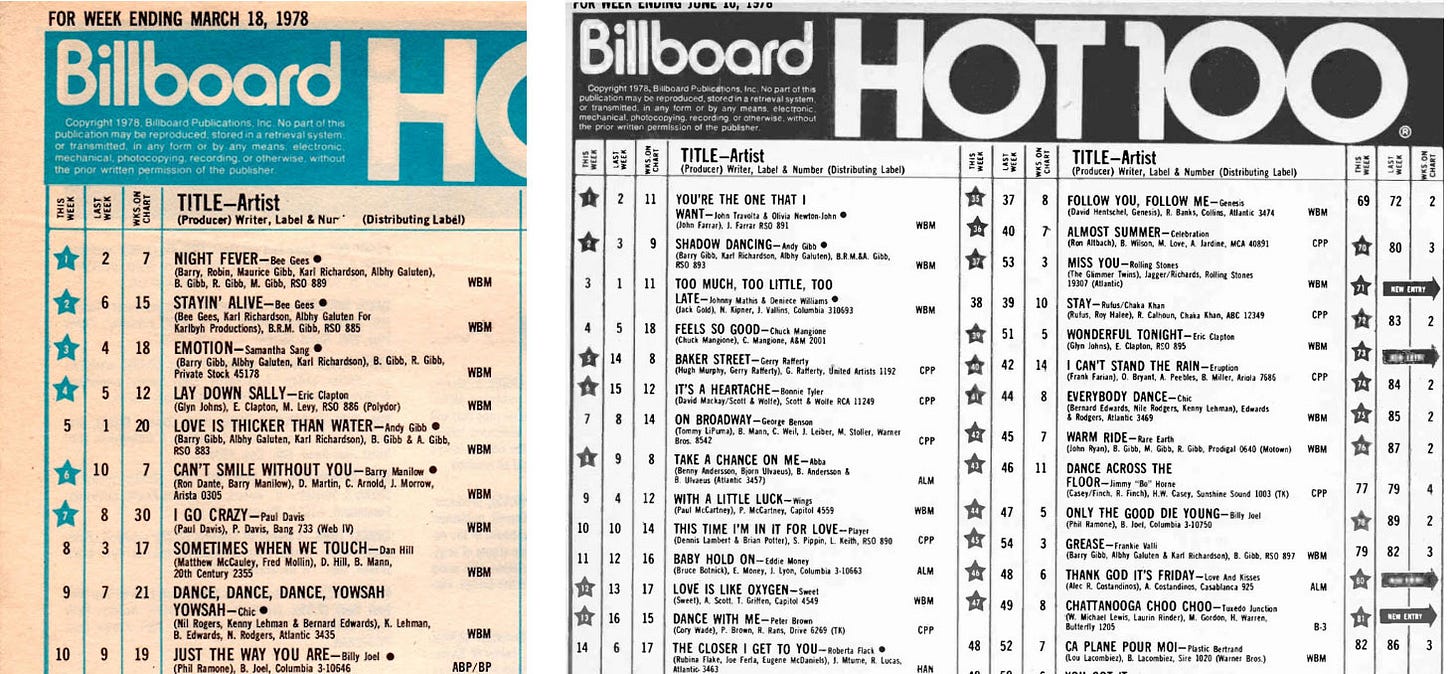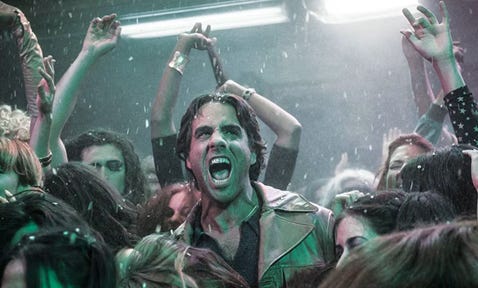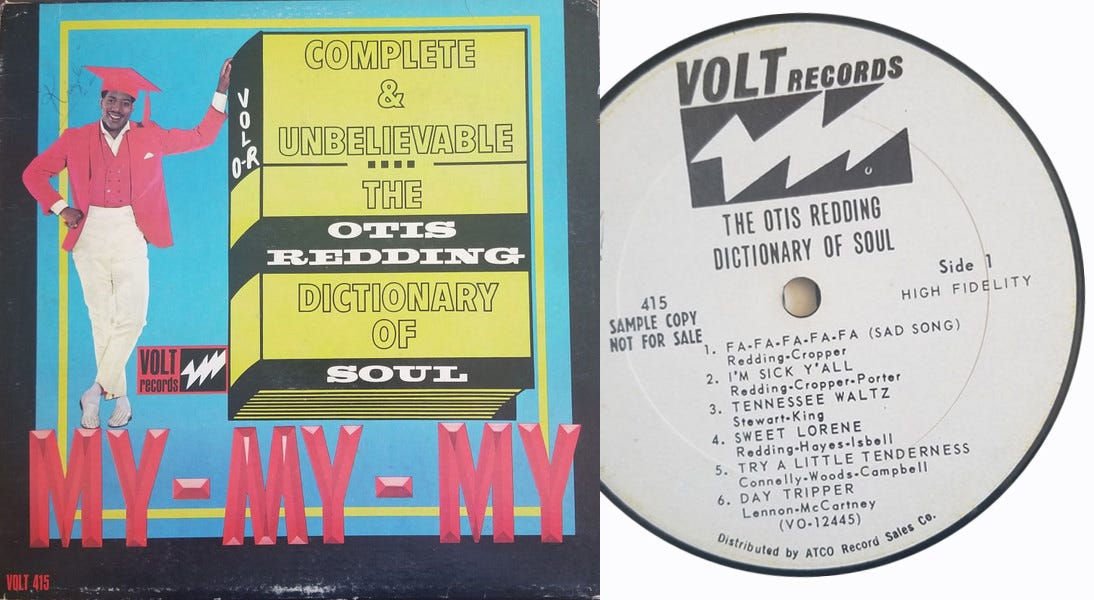The Record Store Years 11) Dealing With The Promo Guys
A memoir of 25 years (1975-2000) spent working in the world of records & music in Seattle, with occasional side trips into writings on Led Zeppelin and other adventures from my musical life.
In my early years at Cellophane Square, there were three main characters who loomed largest in the label rep legend (names have been changed to protect the guilty!) – Barney Gibbs from PolyGram, Robert Daltry from MCA, and Domore Coker, also from MCA or some affiliate. While there were other label reps and many surrogates who sold to us regularly, these three were the ones we did the most business with and were also the most guilty of blatantly abusing the system that provided them with employment. Not coincidentally, I believe they were also the senior members of their team in the area, and had the autonomy to do what they wanted without scrutiny or questions being asked.
These guys did very well for themselves even before the extra income from promo selling – Robert Daltry lived in a beautiful big house in a posh neighborhood of Seattle with a spectacular mountain/sound view, and Barney Gibbs was in a very private and equally luxurious place not far from where Kurt Cobain would live (and die) a decade and a half later. I don’t really know what their salaries were, but in the heady days of Saturday Night Fever (PolyGram/RSO) and Damn The Torpedoes (Backstreets/MCA), I expect they were both pulling in what would be over a 6-figure salary today. They drove nice cars, lived in beautiful homes, and had only the best drugs at their disposal.
Of the three, Daltry was by far the most pleasant to deal with. He was an affable, well-tanned fellow who wasn’t above sharing the occasional toke or line of blow with you when doing a transaction at his house or in the back room of the store. Despite a slightly oily, hard-sell quality to his demeanor, I believe he was a genuinely decent guy and he had at least a passing interest in music. His tastes ran to the nascent ‘smooth jazz’ of The Crusaders and late Steely Dan, but he was fairly knowledgeable about rock ‘n’ roll and could talk music with you on a competent level.
Daltry was also realistic about the value of the product he sold us, in the sense that he knew what Cellophane Square would pay for the most (or least) saleable stuff he brought in, and rather than try to beat you up for a deal by paying him higher prices, he would tailor the stacks he brought in to contain more of the best-selling, highest-value stuff, and take what he was offered on the rest without haggling. Only rarely would he question the prices offered and he always left the transaction happy, with a wad of cash in his pocket.
Barney Gibbs was a completely different story. He was a big man physically, not fat but tall and wide, with prematurely thinning hair and a round baby face, and he absolutely oozed smarminess from every pore. He also had an air of self-importance, fueled in part by the success of his recent assignments on RSO Records which included the Saturday Night Fever and Grease soundtrack albums, plus a few Bee Gees releases – zillion-selling record breakers all, and certainly good excuses for a promo man to walk around thinking his shit is made of ice cream.
Above: Not only did the Bee Gees hold the top two spots on the singles chart in March 1978, Samantha Strong, Eric Clapton and Andy Gibb held the next three with RSO releases as well. And in June it was Olivia Newton John, the Grease soundtrack, and two different Andy Gibb and Clapton singles selling like hot cakes.
Gibbs also seemed to make a generous living working for PolyGram with a nice car and house, but unlike his counterpart from MCA, he came across as greedy and would always haggle over the prices being offered. I would often use a little ‘buying psychology’ on him and agree to paying a bit more on the stuff he thought was hottest while offering a bit lower than I would have on other stuff that he didn’t care about to compensate. It always worked out and generally Barney would also walk out the [back] door happy, with a wad of cash in his pocket.
During the heyday of RSO when Saturday Night Fever was number one and flying off the shelves, the guy was supplying us with product more or less on demand. I remember him bringing in 50-count boxes of the smokin’ hot soundtrack album, sealed in shrink wrap but marked as promotional with a small corner of the jacket lopped off, as well as similar quantities of whatever equally-hot Bee Gees release had been rushed out to cash in on the frenzy. We’d pay basically $2.00 per disc ($4.00 for the double soundtrack LP) and mark them up to the neighborhood of $5.00 per disc – in the racks at $4.99 for a single LP, $8.99 or $9.99 for a double – and if you didn’t mind that little cut on the jacket you could pick up the hottest record in the country for $2 or $3 less than our competition. And if it’s out of stock don’t worry, we’ll have more soon!
At some point during the RSO frenzy of ‘77/’78 we ended up with a big stack of 50-count boxes at the store that were packed with empty Saturday Night Fever and Grease album jackets. I don’t recall all the details of them coming into our possession, but they undoubtedly originated from Gibbs, and they played an important part in ‘The Great Melts Scam’ of 1979 – a story soon to be told.
The last member of this trio of label guys we will call Domore Coker, and I only had one significant interaction with him, but it was a doozy. I don’t recall for certain what label he worked for, and though I knew who he was I never dealt with him because he would only sell to Roy when he came into the store.
I recall Roy mentioning that Domore could be ‘difficult,’ but had no idea what that meant until one day when he was in the store selling some records at the front counter. This was unusual, but he had shown up unexpectedly and the store was busy with Roy at the front counter, so the deal was being conducted there. Domore was standing at the end of the sales counter and had stepped into the space between the counter and the door, blocking employee access to the behind-counter area, and I politely (I thought) asked him to move out a bit so that the access was clear. He absolutely exploded at me, instantly going into a blind rage and spewing an expletive-peppered tirade that included threats of ‘having me fired.’ I was so taken aback I was at a rare loss for words and backed off as Roy tried to smooth out the situation and get him paid and out the door as fast as possible.
After the incident Roy elaborated a bit more for me on the ‘difficult’ side of this guy, which was basically that he was especially paranoid and had a reputation for going off on people. This was corroborated by other people I got to know in the industry in later years, and if you ever saw the ill-fated (but not inaccurate) HBO show Vinyl about the ‘70s record biz whose lead character is a domineering, coke-snorting alpha male, you have a good idea of what ol’ Domore Coker was like. Ah, the good old days!
There is one more indelible character from the promo world I can’t overlook, and that was Big Ed. We were never sure where Big Ed’s product came from, but he didn’t work for a label and he was an old-school kind of guy, in the sense that he was in his forties, I would guess, and had been in and/or around the record business for a long time. He knew everybody in the local biz and everybody knew or knew of him, and he was the kind of guy that no doubt could have irons in various fires at the same time; an independent promo man for hire, or perhaps just a hustler.
Big Ed was indeed big in both stature and personality. He was a jovial, balding character who actually knew and enjoyed music and would recount stories and chat amiably while you went through his promos at the counter. One definitely got the sense that there was a shady side to him, and indeed I did witness a handgun sitting openly on a desk in his home when I was there one time to buy a large stack of records, but he was always a pleasure to deal with and was one of my favorite selling customers.
One occasion I had to go to Big Ed’s house (a considerably more modest residence that the previously mentioned swells) was when he decided to liquidate some of his own collection, consisting of soul, jazz and rock LPs dating back to the early 60s. He had amassed an impressive collection and kept all of them in mint condition, and most of them were promos. When I think of the gold that passed through my hands that day I still get a thrill – original mono pressings of Otis Redding, Aretha Franklin, Miles, Monk; early British Invasion stuff – many of them white-label. I was able to buy some of the collection for myself through the store’s employee sign-out system, though at the time I couldn’t afford to get as much of it as I would have liked.
NEXT: Soap Operas & Competition






I remember these guy as. Domore Coker became my contact. I went to his place a few times. He was a big jerk.
He hated rock and roll, except Steely Dan, who were "intelligent".
He was a snob about cocaine also.. I won't bother with that story.
The most surprising thing to me about this is that you guys actually went to people's homes to do deals! That was certainly not in practice by the time I got there. How did that start and when did that end?